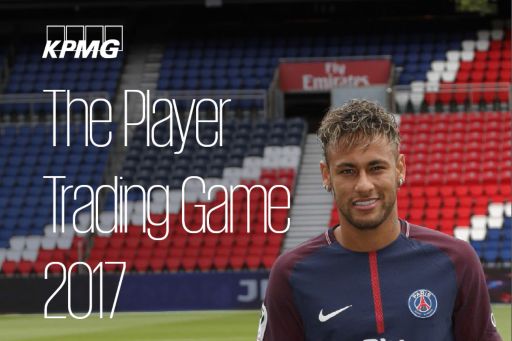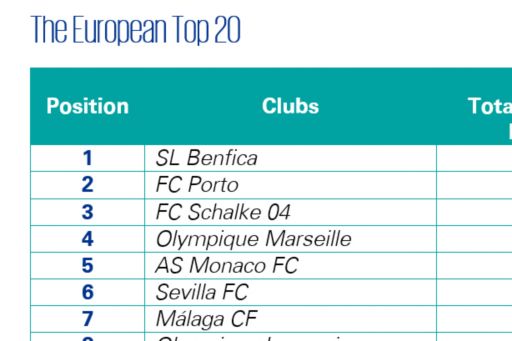Press Release - 13 September 2017 (English)
Press Release - 13 September 2017 (English)
Portuguese clubs top the table of KPMG Football Benchmark’s Player Trading Ranking, with no Premier League representation

Portuguese clubs top the table of KPMG Football Benchmark’s Player Trading Ranking, with no Premier League representation
- Following the close of the summer transfer window, KPMG Football Benchmark shares its inaugural edition of “The Player Trading Game”, a report concerning the accounting treatment of footballers’ transactions for more than 150 football clubs for the 2014/15 and 2015/16 seasons (latest available financial statements).
- For the purposes of this report, player trading can be defined as the sum of four main operations:
(+/-) Profit/Loss on disposal of players
(-) Amortisation
(+/-) Revenues/costs associated to loaned players
(-) Impairment
= Player trading balance
- The top 20 European clubs, which can be simplistically considered “net sellers”, are from five different leagues: France, Italy, Spain, Portugal and Germany.
- Portuguese giants SL Benfica (1st) and FC Porto (2nd) lead the ranking with an aggregated player trading balance of respectively EUR 65 million and 58.2 million for the analysed period (i.e. 2014/15 and 2015/16 seasons).
- France’s Ligue 1 is the most represented league in the top 20 with six clubs, while, among the “big five”, only the Premier League is not represented in the ranking.
- Among those that we can define as “net buyers”, Manchester City FC (EUR -171.9 million), Paris Saint-Germain FC (EUR -179.4 million) and Manchester United FC (EUR -238.9 million) totaled the highest negative player trading balance.
“Possibly unsurprisingly, no English clubs are included in the “European Top 20” by player trading. This is likely attributable to the profile and sizeable broadcasting income of the Premier League and the greater means they enjoy compared to many of their European counterparts. Such features rather place them on the “buy side” of the market and to some extent remove the necessity to leverage player trading activity. Interestingly also Dutch clubs, which have traditionally produced an abundance of talent, are missing from our ranking,” commented Andrea Sartori, KPMG’s Global Head of Sports and the report’s author.
“As transfer fees continue to increase, “net sellers” maintaining prolific academies and successful scouting networks might be in the position to further exploit this competitive advantage. On the other hand, for the biggest European football clubs, which are intrinsically part of the global entertainment industry, attracting the best talent is an absolute must to ensure a competitive advantage against their peers on and off the pitch and to grow their global fan base. Despite their spending is not foreseen to decrease in the short-term, it has to be seen whether paying these record-breaking transfer fees is sustainable in the longer term,” continued Sartori.
The ranking of the top 20 European clubs in terms of player trading is led by SL Benfica and FC Porto, which, together with Sporting CP (20th), are the only non-‘big five’ representatives in the top 20.
The clubs representing France’s Ligue 1 include Olympique de Marseille and AS Monaco FC, both at the foot of the player trading podium, along with Olympique Lyonnais, Montpellier HSC, AS Saint-Etienne and LOSC Lille.
Italy’s Serie A is the second most-represented league in our report, with five clubs in the European Top 20. UC Sampdoria (EUR 28.7 million), ranked 10th, are the highest ranked Italian club.
Represented by four clubs in the ranking is Spain’s La Liga, where Sevilla FC (6th) have developed as transfer market experts and are the leading side with total player trading activities of almost EUR 40 million.
In general, the best performing clubs in terms of player trading are not classified as European superpowers. Manchester City FC and Manchester United FC, together with Paris Saint-Germain FC, have recorded the highest negative player trading balance in the two seasons under review (i.e. 2014/15 and 2015/16) and, following their transfer activity this summer, are likely to remain at the bottom of the ranking in the next seasons.
Notes to editors
*The foundation of this report is an analysis of the publicly available financial statements of the last two football seasons (2014/15 and 2015/16) from a selection of more than 150 clubs. Thus, it is important to note that this analysis does not consider the latest transfers to be accounted for in the 2016/17 and 2017/18 financial statements.
Further details of the methodology can be found in the report: footballbenchmark.com
Thai Version :
เคพีเอ็มจี เผยสโมสรฟุตบอลจากประเทศโปรตุเกส คว้าอันดับสูงสุดในรายงาน Player Trading Ranking 2017 ไร้ทีมจากพรีเมียร์ลีกติดอันดับ
The “European Top 20” by player trading can be found on the list below.

About KPMG International
KPMG is a global network of professional services firms providing Audit, Tax and Advisory services. We operate in 155 countries and have 174,000 people working in member firms around the world. The independent member firms of the KPMG network are affiliated with KPMG International Cooperative ("KPMG International"), a Swiss entity. Each KPMG firm is a legally distinct and separate entity and describes itself as such.
About KPMG in Thailand
KPMG in Thailand, with more than 1,500 professionals offering audit, tax, and advisory services, is a member firm of the KPMG network of independent firms affiliated with KPMG International Cooperative (“KPMG International”), a Swiss entity.
For media enquiries, please contact:
Ploi Phayakvichien
Tel: 02 677 2034
ploi@kpmg.co.th
Praewpan Luangphaipol
Tel: 02 677 2141
praewpan@kpmg.co.th
Some or all of the services described herein may not be permissible for KPMG audit clients and their affiliates or related entities.
© 2026 KPMG Phoomchai Holdings Co., Ltd., a Thai limited liability company and a member firm of the KPMG global organization of independent member firms affiliated with KPMG International Limited, a private English company limited by guarantee. All rights reserved.
For more detail about the structure of the KPMG global organization please visit https://kpmg.com/governance.